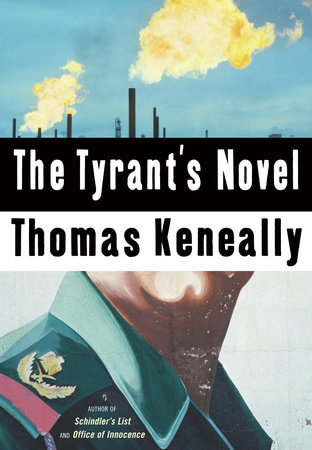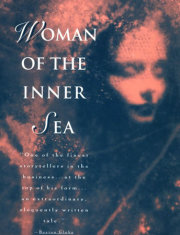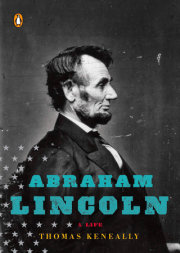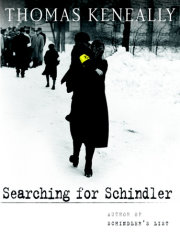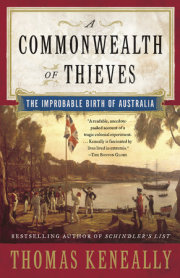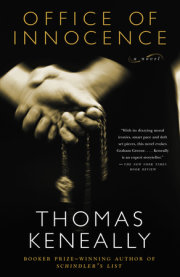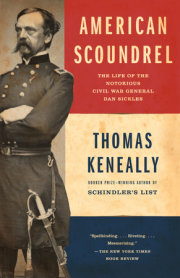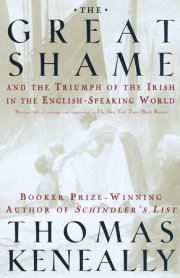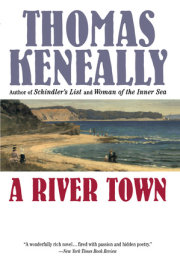A tyrant builds up around him more titles than the most slavish subject could possibly utter or remember. Tyrants abound in superlatives. Chosen One, Commander-in-Chief, Regulator of Laws, Supreme Judge, Overchief. If the tyrant goes on naming himself with names implying broad power and intimate connection with the people, he will come up in the end with a title which can be used ironically. In my land,
Great Uncle was it. Everyone remembered that one.
Great Uncle of the People. I suggest you call him Ian Stark, since Stark is a name associated with tribalism and toughness, and he came from a tribal, tough background--the clan symbol of five dots was incised on Great Uncle's wrist.
Great Uncle was, as the name implies, both kindly and justly severe. Imagine you're far back, two hundred years ago, when in the West the bodies of criminals were displayed. Not a long time ago, two hundred years. Remember that then when I say it happened in my home city, when Mrs. Douglas's nephew was so displayed for wronging Great Uncle. The nephew was in charge of the fountains and swimming pools at the Bellevue Palace, and Great Uncle had not spent any time there for the past two months. The chlorine and pH levels had built up under Mrs. Douglas's nephew, whose mind was on a particular soldier's wife living two streets from the Bellevue's broad, lion-engraved gate. Great Uncle made a surprise visit to Bellevue one afternoon and began to swim in his pool--his favorite exercise now that his hip and back were said to be playing up. He came out of the water with a rash between the legs. Various members of the Overguard stood above Mrs. Douglas's miscreant nephew while the pH levels were tested, and then he was taken in a van to Wolfmount, the prison, and shot dead, and his naked corpse displayed from the ramparts of the place. Wolfmount was often called the Palace of Disappearance, but the nephew's body was all too visible. He would have better been employed in California, where clients, though litigious, do not usually resort to capital punishment for a high pH. Not that Great Uncle or any of the Overguard gave an explanation of why the well-molded young body hung from the outer walls of Wolfmount. Great Uncle did not choose to have the people know about rashes, pimples, hip twinges, or any other sign of mortal squalor. Mrs. Douglas had got the information only from her sonless sister, for her dead nephew, as displayed on prison walls, was not readily identifiable. She had then, returning from the shops with a few modest bags of groceries, with tears in her eyes, whispered it to my wife and me on the interior stairwell of our block of flats.
Wolfmount was seven miles west of us in a working-class area and we did not like to think of the exposure of corpses there. We did not often drive there and could forget the place. Mrs. Douglas was determined not to let us do so.
His mother is crazy, Mrs. Douglas told us. She would like to see the body released, but they won't release it yet. Not till the birds have had their way with the eyes and the tongue. Poor boy! Poor boy!
She rolled her eyes as if she feared someone might be listening, and lowered her voice. Too much chlorine in the water, she said. I thought he liked chlorine.
It was a subtle reference to Great Uncle's bent for chemicals, most particularly in making war, and I coughed at the recollection of gas from my service to the state as a soldier.
And then Mrs. Douglas suddenly abstracted herself from the tragedy, as our people had learned to do. She resigned herself to events and removed herself from them. Her hunched shoulders descended, whereas ten seconds before they had been raised high with the sense that some serious explanation was needed. For anger was a one-way street for us. It descended from heaven. It did not have the right of ascent. She turned to my wife.
We all miss you on the telly, she said.
I could see that Sarah was still fixed on the story of the chemically negligent nephew. She had not left it yet. My wife was a dangerous woman, a woman of conviction.
Oh, said Sarah abstractedly. My wife was a well-known beauty, who would have been more so in a saner place, where she did not need to frown about retribution being so summary. It's very hard work, you know. Television. I'd been in that series for years and years, since I was a child.
I understand that, Mrs. Douglas conceded. But we still miss you, Mrs. Sheriff.
The truth was that Great Uncle had summoned the producer of the series,
Daily Lives, and asked that my wife's character acquire a betrothed who had fallen in the final days of the war against the Others. (Great Uncle had insisted the enemy be not dignified by any other name than that.) The producer was so instructed in the hope that this plot shift might console the widows and girlfriends of the men, aged between fifteen and sixty, who had given their lives in the final, deadlocked campaigns in the straits, not far from where I had fought some five years earlier.
A woman of Sarah's craft, a woman who had read for the stage and settled for television and film, could spot the lie behind the direction the daily television show took. She could not blame our friend the producer for wanting to go along with Great Uncle's production notes. He had three children. And besides, there
were thousands of casualties, deaths and life-shortening injuries to be absorbed into the social fabric, to be sucked in, swallowed, and somehow reconciled by the populace. My wife had lasted four episodes as the bereaved fiancee, and then had pleaded overpowering migraine--untruth does produce overpowering migraine--and refused to appear further. It took some considerable skill on the part of the writers to explain her absence on the fifth night, but they achieved it through the mouths of the other characters, opining that not only had the Others unjustly deprived her soldier sweetheart of life, they had suddenly, through a brain clot which, without the grief, might not have formed, removed the fiancee from life as well.
A doctor of our acquaintance testified to Sarah's migrainous condition, but she was not forgiven, and had no trade in television now.
I am working on the stage at the moment, my wife told Mrs. Douglas.
Indeed, she and a small group of her friends were rehearsing Tennessee Williams's
The Glass Menagerie. It would be played in a warehouse for two nights, before an invited audience. My wife would earn nothing from playing Laura.
But I had no complaints. My wife was my wife. I had come through the war with nothing worse than eczema of the hands and a vague loathing. As for the matter of Great Uncle, caution drew its veil. I saw the two women, the pool keeper's aunt and my wife, look at each other out of their haunted eyes. Such eyes were Great Uncle's gift to our nation's splendid women.
Actors are mysterious people, and, as I said, my wife, Sarah Manners, had indeed taken on the symptoms of severe headaches. The attacks were regular, although they improved when her small theater group was at work, particularly during rehearsal. But the complaint, and the diminishment of appetite which accompanied it, made her seem gaunter than she had been when she was a famous and ample television goddess. Great Uncle, by his intrusion in the script, reduced her to the haunted girl he meant her to play, but we had been to the best doctors, and they said it was no more than a phase, that people often passed through a peak of migraine in their lives and emerged from it with a clearer head. One even suggested that the chemicals released by pregnancy would prove to be the cure. Although my wife was willing, we had not been fortunate in that regard.
So here I give you, through this one encounter with Mrs. Douglas, what it was to live with Great Uncle on one's shoulder. He had the power to make water soft, and if for an hour it turned hard, that was soon amended. He had the power to separate dead sons from their mothers. Having served in the Summer Island campaign, I know that to be the truth. And he had the power to bend actors according to his imagination, whether they consented or not.
Every second Thursday, we still dined at Sarah's old producer's, Andrew Kennedy's, house. Andrew had been promoted to head of the National Broadcasting Network, and so was a man to reckon with. Yet I knew also, because he told me once, that though middle-aged and with a wife and three grown children, he had considered at the time of his promotion becoming an escapee, fleeing north into Istria and seeking asylum. But on a late summer's evening, as one sat around his swimming pool in the midst of his five acres of ornate and devoutly tended garden, one could understand why he might have inhaled, taken his new post, and decided to stay another winter. In the spring he could review whether he really wished to travel as a nobody, by truck, hidden amongst cargoes, over the final border where he would declare himself a refugee, a man adrift, a man with no resources but those he carried by suitcase or in his pockets.
These days, Andrew met with Great Uncle at least once a week, and chatted with people in the outer office both before going in and after leaving. People were, of course, very careful not to say too much, but even the most wary bureaucrats and Overguard gave away something more than they intended. That, combined with what he observed himself, made Andrew Kennedy increasingly hopeful that Great Uncle might die. He put what I can see now was too much hope in the possibility. But he knew that, as well as other aspects of age, such as short sight and the need to have frequent recourse to black hair dye, Great Uncle had persistent hip and back problems--by all reports a slipped disk--which made it painful for him to walk even in the office. He was getting paunchier too, a fact he disguised with tailoring and a corset when he appeared in his military uniform.
It was at one of his meetings with Great Uncle that Andrew Kennedy had been given the helpful suggestion that Sarah should be turned into the grieving victim of the Others. Great Uncle had frequent production and programming issues to raise with Andrew. And all the time Andrew made notes his eyes flicked over the face and body of Great Uncle, looking for subtle indications of death. Great Uncle, said Andrew, could not be sleeping too well, since he increasingly asked for certain favorite films of his to be programmed for late-night television. The
Godfather gangster films,
The Old Man and the Sea (Great Uncle the fisherman, and the ruthless, murderous fish representing the body politic),
The Day of the Jackal, The Conversation, Enemy of the State. Knowing that Great Uncle had an expert grasp of and interest in the Stalinist era, Andrew had at one stage run the wonderful Russian film of the Stalinist purges,
Burnt by the Sun, and Great Uncle asked him not to do it again, because it sentimentalized the whole issue of treachery in subordinates.
Great Uncle, said Andrew, was exceedingly mild in these demands--they could sound very nearly like requests. Only in prison, or against the wall, did you discover that what had been suggested had actually been an edict.
Anyhow, at his home, and around his pool during the summer in the piny hills of Forest Tops, Andrew Kennedy still ran his regular salon, which gave all his friends a sense of stability. I had been asked to join the circle after the publication of my first book, a series of connected short stories about our campaigns at Summer Island. At Summer Island I had seen bravery and savagery and crimes I did not dare mention even in the book, even in fiction covered by disclaimers. Thus I felt an impostor to an extent. But it was there at the Kennedys' that I first sighted but barely spoke to Sarah Manners, who became my famed wife.
What I liked about Andrew's gatherings was that they were like the literary or artistic salons one read about, and while we were there we felt we had freedom of choice and speech, and we felt creative. In the old days, prior to our rebellions against our British-controlled monarchy and during the post-Great War British Mandate period, our Anglophile parents and grandparents had engaged in such gatherings, and city people with resources tried to sustain the urbane habit. In various ways, even though English was not their first language, the British Mandate period made the bureaucrats, the lawyers, the professors, other well-off city people like my father--the chief surveyor of the city--nearly as British as, say, a Canadian, a New Zealander, an Australian, or a member of India's ruling class.
At the time my book was published, by the way, the United States was our ally, since the Others had interned U.S. citizens and sunk American tankers on their way through the Hordern Straits to collect our oil at the Summer Island terminals. Our army was momentarily glamorous, for unlike the Others, we had no suicide troops and could be imagined as normal frontline soldiers, if such creatures ever existed. Hence my short stories were published in the United States, and sympathetically reviewed on page five of the
New York Times Book Review. Since then, however, because of his experimentation with chemical weapons, Great Uncle, and our nation, had lost our standing in the American press, and policy had taken a total reverse.
I had in the past three years been working on a novel, now virtually completed, for which I had received an advance against royalties of forty thousand U.S. dollars in the days of our alliance, and that money, stored in a U.S. dollar account in a bank in the city, was a godsend to Sarah and me and gave us our latitude. (I would be receiving a further thirty thousand dollars on delivery of the manuscript and thirty thousand on publication.) My advance had liberated me from our Cultural Commission, and its head, Old Billy Salter, lawyer and disappointed author. Giving support to writers and poets, the Cultural Commission acquired the right to read and censor books, and Billy, who had begun as quite a nice old fellow, a good host, liberal-hearted and widely read, seemed, over the past five years, to have come to enjoy his power over the word, his management of the national literary farm.
Copyright © 2004 by Thomas Keneally. All rights reserved. No part of this excerpt may be reproduced or reprinted without permission in writing from the publisher.

